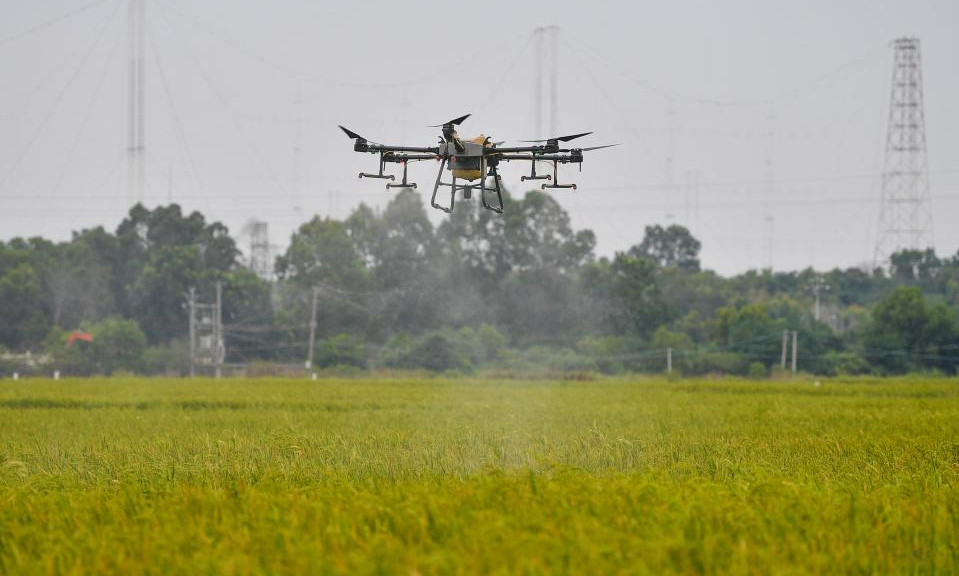Homegrown aircraft bolster China's emergency rescue capabilities
BEIJING, Oct. 25 (Xinhua) -- China's aviation industry has bolstered the country's emergency rescue capabilities by advancing the continuous development of independently-developed aircraft.
A range of homegrown civil aircraft, such as large amphibious aircraft, large unmanned aerial vehicle (UAVs) and helicopters, are moving ahead to serve emergency rescue missions, according to the Aviation Industry Corporation of China (AVIC), the country's leading planemaker.
These aircraft have been used for various emergency missions in the country, such as fighting forest fires, drought relief, ecological protection and telecommunications restoration, among others.
The AG600M amphibious firefighting aircraft has successfully conducted its pivotal tests of scooping and water dropping, which are key features of this large amphibious aircraft designed to combat forest fires.
During the testing in late September, the AG600M consecutively conducted flight tests of aerial water dropping, landing on a nearby reservoir and taxiing scooping, taking off again and dropping water over the preset area, and then landing at the reservoir.
AG600M is a full-state, new-configuration firefighting model belonging to China's AG600 large amphibious aircraft family, which is specially developed by the AVIC to serve the country's emergency rescue missions.
The successful completion of pivotal flight tests demonstrated that China's independently-developed aeronautical products could support its emergency rescue capabilities, said He Shengqiang, deputy general manager of AVIC.
A planemaker with the capability to support the entire industrial chain, the AVIC plays a major role in sustaining the country's aircraft development and strengthening its air emergency rescue system, He added.
Multiple homegrown aircraft capable of serving emergency rescue missions, including the AC352 and AC313A civil helicopters, and various models of the Wing Loong large civil UAV family, are making rapid progress by taking significant strides forward in their development.
The Z15, also known as the AC352, obtained certification from the Civil Aviation Administration of China in late July, a key step toward its market entry.
As China's first homegrown medium-sized civil helicopter, it can carry up to 16 passengers and has high search and rescue efficiency in diverse missions.
Going ahead, more configurations of AC352 for firefighting, emergency transport and medical rescue missions are expected, according to the AVIC.
The renowned Wing Loong large civil UAV family has also tapped vast potential in the emergency rescue field by conducting cloud seeding operations over drought-hit regions and supporting emergency communications in quake-hit Sichuan.
China's 14th Five-Year Plan (2021-2025) has proposed to improve the national emergency management system by strengthening and improving the air rescue system and capabilities.
The State Council of China has unveiled a plan to boost the development and capabilities of the modern emergency management system over the 2021-2025 period by increasing aircraft for forest fire-fighting missions and expanding air-rescue capacities to cover key forests and grasslands across the country.
The AVIC will focus on meeting the demands of China's ever-improving emergency rescue capacities with independently-developed products, technologies and services to sustain people's livelihood, well-being and economic development of the nation, He said.
Photos
Related Stories
- China's large amphibious aircraft gains major progress
- 2nd AG600M firefighting aircraft completes maiden flight test in Zhuhai
- China's AG600M firefighting aircraft makes maiden amphibious flight
- China's aircraft leasing hub sees growing business
- China's new configuration AG600 large amphibious aircraft makes maiden flight
- China's AG600 large amphibious aircraft gets financial-leasing support
- Boeing to have 15 aircraft conversion lines in China by end of 2022
Copyright © 2022 People's Daily Online. All Rights Reserved.









